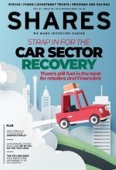Archived article
Please note that tax, investment, pension and ISA rules can change and the information and any views contained in this article may now be inaccurate.
Planning for bad times can make you stronger

Investing involves some big decisions that can only be made if you think about the good and bad points.
You need to think about how much money you could lose as well as make. And when it comes to saving in general you must also think about squirreling away adequate money to cope with difficult times in life as well as funding treats in the good times.
Having this rounded view is a crucial part of the overall financial planning picture. It can help to avoid being over-confident and take excessive risks. Equally it can act as a reality check to stop you spending everything each time you build up a decent savings pot.
Banks are regularly put through stress tests to see if they have enough capital to withstand an economic shock. Any that fail a stress test have to build up more capital reserves, essentially bolster their savings so they don’t get into trouble in bad times.
This is a good approach to take with your own finances. If something went wrong, such as losing your job, do you have enough money to pay the bills and other outgoings until you find a new job? In the same situation, do you have savings that can help sustain debt repayments?
Think of it as sensible financial planning rather than being overtly negative and panicking about the worst case scenario.
The Financial Conduct Authority, a regulator, has been giving these scenarios a lot of thought and says it is important to be ready for an economic downturn.
Under the latest stress test scenario from the Bank of England, UK unemployment would hit 9.2% (versus the current 3.8% rate), house prices would fall by a third and the stock market would crash by 41%. The same test also assumes UK GDP falls by 4.7% and world GDP declines by 2.6%.
Such a negative environment could leave many people unable to keep up debt repayments. They and others would also lose access to further credit. People may struggle to keep up their mortgage payments; failure to do so would see an increase in repossessions.
Individuals who were hoping to downsize their home to help fund retirement would be in a pickle. And people losing their jobs would not only be without a salary, they would also lose out on workplace pension contributions, thereby potentially hurting their future income in retirement.
Those already in retirement would see asset values fall and potentially see severe damage to their value of their portfolios at a time when they are reliant on the markets for income. Clearly many people would struggle in such a negative environment.
These statistics are quite alarming; the FCA calls them ‘severe and unlikely’ but not impossible. They should be a wake-up call for the need to be more financially prepared for the worst case scenario as well as not being reckless with investment decisions.
Important information:
These articles are provided by Shares magazine which is published by AJ Bell Media, a part of AJ Bell. Shares is not written by AJ Bell.
Shares is provided for your general information and use and is not a personal recommendation to invest. It is not intended to be relied upon by you in making or not making any investment decisions. The investments referred to in these articles will not be suitable for all investors. If in doubt please seek appropriate independent financial advice.
Investors acting on the information in these articles do so at their own risk and AJ Bell Media and its staff do not accept liability for losses suffered by investors as a result of their investment decisions.

 magazine
magazine








